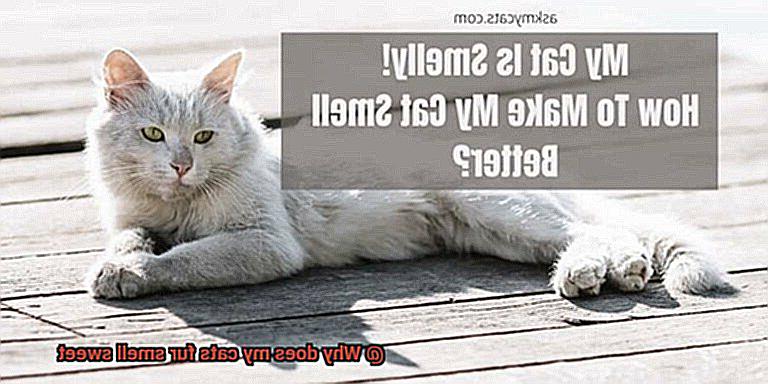Do you consider yourself a cat person? Are you continually drawn to your feline’s velvety coat and the delightful fragrance that emanates from it? Have you ever noticed that your cat’s fur has a sweet scent and wondered about the reasons behind it? Well, there are several explanations for this pleasant aroma that may surprise you.
Cats are known for their fastidious grooming habits, but there are other contributing factors to the sweetness of their fur. One of the most significant factors is their diet. A high-quality diet can lead to better-smelling fur than a lower quality one. Certain ingredients in cat food can also contribute to an overall sweet scent.

Another factor could be the grooming products you use on your cat. If you use shampoos or conditioners with a sweet scent, they can leave residue in your cat’s fur, making them smell lovely. Furthermore, scented products used in your home, such as air fresheners or cleaning supplies, can infuse your cat’s coat with a delightful fragrance.
So next time you snuggle up with your furry friend and breathe in their sweet aroma, remember that it could be due to their diet, grooming products or even environmental scents. Regardless of the reason behind it, nothing beats cuddling up with a sweet-smelling feline companion.
Diet: The Impact of Protein on a Cat’s Fur
Specifically, the protein content in their food plays a significant role.
Protein is essential for cats to maintain healthy fur, skin, and muscles. However, not all proteins are created equal. Low-quality proteins or an insufficient amount of protein in a cat’s diet can lead to an unpleasant odor emanating from their coat. This happens because the cat’s body breaks down the protein into amino acids, which are then excreted through their skin and fur, resulting in a musty or sour smell.
On the other hand, feeding your cat high-quality protein sources can lead to a sweet-smelling coat. Some excellent options include chicken, turkey, fish, and beef. These protein sources contain all the necessary amino acids that your cat needs for healthy fur and skin.
It’s important to note that some cats may have specific dietary requirements due to medical conditions or allergies. Consulting with a veterinarian is always recommended to determine the best diet for your feline friend.
But what if your cat’s fur already has a sweet scent? While diet may be one factor, grooming habits and underlying health conditions can also play a role. When cats groom themselves excessively due to stress or anxiety, it can cause an excess of natural oils on their skin and fur, resulting in a sweet or musty scent.
Similarly, certain health conditions such as diabetes or liver disease can cause toxins to build up in a cat’s body, leading to an unusual odor in their coat. Monitoring your cat’s diet and grooming habits and consulting with a veterinarian if you notice any changes or concerns can help ensure that your cat remains healthy and happy with a pleasant, neutral scent to their fur.
Grooming Habits: An Overabundance of Natural Oils
They spend a significant amount of time cleaning themselves, which involves the application of natural oils onto their fur. These oils provide several benefits, including keeping their coat healthy and shiny. However, an overabundance of these natural oils can lead to an overpowering sweet smell.
The scent of a cat’s fur can also be influenced by their diet. If your furry friend has a particularly sweet diet, this will be reflected in the scent of their fur. Additionally, certain medications or supplements can cause changes in the scent of a cat’s fur.
To manage an overabundance of natural oils on your cat’s fur, you must groom them regularly. Using a brush or comb will help distribute the oils evenly throughout their coat and prevent a buildup in one specific area. Ensuring that your cat is on a healthy diet and getting enough exercise is also crucial as it impacts their natural oil production.
However, if you notice any sudden changes in the scent of your cat’s fur, it’s vital to consult with a veterinarian. This could be a sign of an underlying health issue that needs to be addressed.
Diabetes: High Levels of Sugar in Urine and Sweat
Diabetes is not just a condition that affects humans, but also our furry friends. When cats have high blood sugar levels, their bodies try to eliminate the excess glucose through urine and sweat. This excess glucose can create a sweet smell on the cat’s fur. In addition to that, cats with diabetes may struggle with grooming themselves, which can further contribute to an unpleasant odor.
As a responsible cat owner, it’s crucial to be aware of the symptoms of diabetes in your pets. A few signs to keep an eye out for are increased thirst and urination, weight loss, and lethargy. If your cat exhibits any of these symptoms or has sweet-smelling fur, it’s best to take them to the vet for diagnosis and treatment.
The good news is that with proper management, cats with diabetes can live happy and healthy lives. Treatment typically involves managing blood sugar levels through diet and medication. By keeping their diabetes under control, you can also help prevent further complications such as kidney disease and blindness.

In conclusion, remember that high levels of sugar in urine and sweat can be a symptom of diabetes in cats. It’s essential to stay vigilant as a pet owner and seek help from a veterinarian if you notice any unusual behavior or scent from your feline friend. To summarize, here are some key points to keep in mind:
- Diabetes can affect both humans and cats
- High blood sugar levels in cats can cause sweet-smelling fur
- Symptoms of diabetes in cats include increased thirst and urination, weight loss, and lethargy
- Treatment involves managing blood sugar levels through diet and medication
- Proper management can prevent further complications such as kidney disease and blindness


Liver Disease and Kidney Problems: Toxins Build Up in the Body
Cats are often viewed as independent creatures with an air of mystery, but they can also face serious health issues that can cause a buildup of toxins in their bodies. Two of the most common health concerns among cats are liver disease and kidney problems. These conditions can be detrimental to your pet’s wellbeing if left untreated, leading to a sweet smell in their fur.
The liver and kidneys play a crucial role in filtering out toxins from the bloodstream and urine, respectively. When these organs fail to function properly, toxins can accumulate in your cat’s body. This buildup can cause a sweet-smelling odor in their fur, similar to that of maple syrup or caramel.
Liver disease may occur due to various factors such as exposure to toxins, medications, or infections. Symptoms of liver disease include vomiting, lethargy, and loss of appetite. On the other hand, kidney problems may develop due to aging, genetics, or underlying health conditions. Symptoms of kidney problems include increased thirst and urination, dehydration, and weight loss.
If you notice any concerning symptoms in your cat, it is crucial to seek veterinary care immediately. Your vet will diagnose any potential health issues and recommend an appropriate treatment plan. In some cases, medication or dietary changes may be necessary to manage liver or kidney problems.
As responsible pet owners, there are measures we could take to prevent liver disease and kidney problems in our feline friends. These include providing a healthy diet that is low in fat and sodium, ensuring regular exercise for your cat, and scheduling routine veterinary checkups.
Other Possible Causes for Sweet Smelling Fur
However, if you notice an unusual sweetness in your cat’s fur, it could be a sign of underlying health issues that require attention. In addition to liver disease and kidney problems, which we discussed in the previous section, there are other possible causes for sweet-smelling fur in cats. Let’s explore these causes further and discover what you can do to keep your cat healthy and happy.
One possible cause for sweet-smelling fur is a dietary change. Switching to a brand that uses natural and organic ingredients or prescription diets for cats with medical conditions can result in a sweet scent due to unique ingredients. Therefore, if you’ve changed your cat’s diet recently, it could be the culprit behind the sweet smell.

Another possible cause is an increase in grooming behavior. Cats are known for their fastidious grooming habits, which produce natural oils that can create a sweet smell. However, excessive grooming can be a sign of allergies or skin irritations. If you notice your cat excessively grooming themselves, consult with your veterinarian to rule out any potential health concerns.
Lastly, certain medications given to cats can also lead to sweet-smelling fur. Antibiotics, antifungal agents, and some flea and tick preventatives can temporarily alter the odor of your cat’s coat. While this may be a harmless side effect of the medication, it is important to monitor your cat’s behavior and consult with your veterinarian if you notice any unusual changes.
How to Monitor Your Cat’s Health and Grooming Habits
Keeping your cat healthy and happy requires monitoring their grooming habits and overall health. Here are five sub-sections to help you monitor your cat’s health and grooming habits:
The Importance of a Healthy Coat
Your cat’s coat should look shiny, clean, and free of mats or tangles. Dull or greasy fur could be a sign of poor nutrition or a skin condition. Regular brushing helps remove loose hair and maintains a healthy coat. If you notice changes in your cat’s coat, take them to the vet for a check-up.

Smell Your Cat’s Fur
Cats have a unique scent, but sweet-smelling fur may indicate an underlying medical issue such as diabetes. If you suspect a medical issue, take your cat to the vet for a proper diagnosis and treatment plan.
Observe Your Cat’s Grooming Habits
A healthy cat grooms itself regularly, and its coat should look and feel healthy. Changes in grooming habits or the appearance of its coat could be a sign of an underlying health condition. Watch for excessive shedding or matting and take appropriate action.
Watch for Changes in Behavior
Changes in behavior can indicate health issues. If your cat is suddenly lethargic or withdrawn, it may be suffering from an underlying illness. Watch for changes in appetite, energy levels, or behavior, and take action if needed.
Regular Vet Visits
Regular visits to the vet are essential in monitoring your cat’s overall health. A vet can perform routine check-ups and blood tests to detect any underlying health issues early on. Additionally, your vet can provide you with tips on how to maintain your cat’s overall health, including its grooming habits.
What to Do if You Notice a Sweet Smell in Your Cat’s Fur
Sweet Smell in Your Cat’s Fur: Causes and Solutions
As a cat owner, it’s important to be aware of any changes in your cat’s behavior or appearance, including any unusual odors in their fur. A sweet scent could be a sign of an underlying medical condition, so it’s important to take action if you notice this smell. Here are some tips on what to do if you notice a sweet smell in your cat’s fur.
Identify the Cause
The first step is to schedule an appointment with your veterinarian. They can rule out any medical conditions that may be causing the sweet smell. Diabetes and ketoacidosis are two possible medical conditions that can cause a sweet smell in your cat’s fur. If your vet rules out any medical conditions, consider other possibilities.
Watch Their Diet
Feeding your cat high-quality food can reduce the likelihood of developing health problems that can cause unusual odors. Some types of protein can cause a sweet scent in their urine and feces, so make sure to choose a protein that agrees with your cat. If you notice the odor after changing their diet, consider switching back to their previous food or trying a different type of protein.
Regular Grooming
Cats groom themselves, but sometimes they need extra help. Brushing your cat’s fur regularly can help remove any dirt or debris that may have accumulated on their fur. This will not only help prevent unpleasant odors but also keep your cat’s coat shiny and healthy. Regular grooming can also help prevent hairballs, which can contribute to bad smells.
Clean Their Litter Box Regularly
A dirty litter box can cause bacterial growth, which can contribute to bad odors. Make sure to scoop out waste daily and replace litter at least once a week. Consider using a litter deodorizer to help control the odor.
Dental Care
Regular dental care can also help prevent any sweet smells from developing on your cat’s breath or in their fur. Brush your cat’s teeth regularly and provide them with dental treats or toys to help keep their teeth clean.
EoojN1MRZTs” >
Conclusion
In summary, the sweet scent of a cat’s fur can be influenced by several factors. A protein-rich diet can lead to a better-smelling coat, while scented grooming products and household items can also contribute to their overall fragrance. However, excessive grooming due to stress or anxiety can result in an excess of natural oils on their skin and fur, leading to a sweet or musty smell.
Furthermore, health issues like diabetes, liver disease, and kidney problems can cause toxins to build up in a cat’s body and affect the odor of their coat. It is vital to keep up with regular veterinary check-ups and monitor your cat’s behavior and scent for any changes.
As responsible pet owners, we should prioritize our feline companions’ health by providing them with proper nutrition, exercise, grooming habits, clean litter boxes, and dental care. If you notice any sudden changes or concerns about your cat’s scent or behavior, it is best to consult with a veterinarian for diagnosis and treatment promptly.







